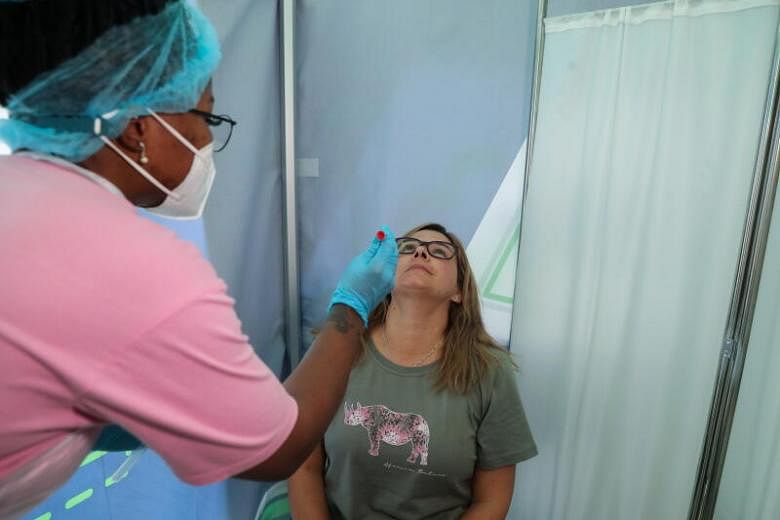LONDON (REUTERS) - Britain announced new measures on Saturday (Nov 27) to try to slow the spread of the newly identified Omicron coronavirus variant and a top health official said there was a "reasonable chance" that vaccines could be less effective against it.
Prime Minister Boris Johnson said arrivals from all countries would have to self-isolate until receiving a negative result from a PCR test, that face masks must be worn in retail settings and it was time to step up booster jabs.
"We need to buy time for our scientists to understand exactly what we are dealing with," he told a news conference.
Johnson said those who had come into contact with people testing positive for a suspected case of Omicron would have to self-isolate for 10 days and that face masks must be worn in shops and on public transport but not restaurants and pubs in England.
England's Chief Medical Officer Chris Whitty told the same news conference there was a reasonable chance that the newly identified variant could be less easy to tackle with vaccines.
"There is a reasonable chance that at least there will be some degree of vaccine escape with this variant," he said.
Health minister Sajid Javid confirmed earlier on Saturday the first two cases of the new variant in Britain, saying they were linked to each other and connected to travel to southern Africa.
The two individuals and all members of their households were being re-tested and told to self-isolate while further testing and contact tracing was done.
England will also add Malawi, Mozambique, Zambia and Angola to its travel "red list" from 0400 GMT on Sunday, meaning British and Irish residents who arrive in the country must quarantine in a government-approved hotel for 10 days.
Non-residents will be refused entry.
That list already contained Botswana, Eswatini, Lesotho, Namibia, South Africa and Zimbabwe.
The discovery of the variant has sparked global concern, a wave of travel bans or curbs and a sell-off on financial markets on Friday as investors worried that Omicron could stall a global recovery from the nearly two-year pandemic.
The health ministry in the German state of Bavaria also announced two confirmed cases of the variant. The two people entered Germany at Munich airport on Nov. 24, before Germany designated South Africa as a virus-variant area, and were now isolating, said the ministry, indicating without stating explicitly that the people had travelled from South Africa.
Czech health authorities also said they were examining a suspected case of the variant in a person who spent time in Namibia.
Omicron, dubbed a "variant of concern" by the World Health Organization, is potentially more contagious than previous variants of the disease, although experts do not know yet if it will cause more or less severe COVID-19 compared to other strains.
The variant was first discovered in South Africa and had also since been detected in Belgium, Botswana, Israel and Hong Kong.
Travel curbs
Although epidemiologists say travel curbs may be too late to stop Omicron from circulating globally, many countries around the world - including the United States, Brazil, Canada and European Union nations - announced travel bans or restrictions on southern Africa on Friday.
On Saturday, Australia said it would ban non-citizens who have been in nine southern African countries from entering and will require supervised 14-day quarantines for Australian citizens returning from there.
Japan said it would extend its tightened border controls to three more African countries after imposing curbs on travel from South Africa, Botswana, Eswatini, Zimbabwe, Namibia and Lesotho on Friday.
Britain also said it was expanding its "red list" to put travel curbs on more southern Africa countries, while South Korea, Sri Lanka, Thailand, Oman and Hungary also announced travel restrictions on southern African nations.
The US Centers for Disease Control (CDC) and Prevention and State Department on Saturday advised against travel to eight southern African countries after the White House also announced new travel restrictions.
The CDC raised its travel recommendation to "Level Four: Very High" for South Africa, Zimbabwe, Namibia, Mozambique, Malawi, Lesotho, Eswatini and Botswana while the State Department issued parallel "Do Not Travel" advisories Saturday.
South Africa is worried that the curbs will hurt tourism and other sectors of its economy, the foreign ministry said on Saturday, adding the government is engaging with countries that have imposed travel bans to persuade them to reconsider.
Omicron has emerged as many countries in Europe are already battling a surge in Covid-19 infections, and some have re-introduced restrictions on social activity to try to stop the spread. Austria and Slovakia have entered lockdowns.











